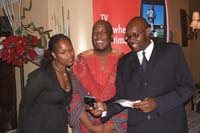
DStv Mobile uses the Digital Video Broadcast-Handheld (DVB-H) technology which enables the broadcast of DStv channels to a special edition mobile phone that has been specially fitted to receive the DVB-H mobile TV signal.
“We are very excited that Kenya becomes one of the first countries in the world to roll out DVB-H services. DMTV will roll out the DVB-H service to all mobile operators in Kenya. We have started discussions with the main players in this arena and are working hard to put all the building blocks in place to ensure that Kenyans have early access to global innovations in the industry,” said Francois Theron, Chief executive DMTV International.
Worldwide research indicates that there is genuine consumer desire for superior quality video and audio content that offers information, as well as entertainment, anywhere, anytime - and Mobile TV is a natural progression from TV in the lounge. Industry analysts predict by 2010, up to 150 million people worldwide will be regular users of mobile broadcast services.
DVB-H allows for the digital terrestrial broadcast of live television channels to mobile telephones. It differs from third generation (3G) Mobile Telephony in that DVB-H is a one-to-many transmission on a linear basis and uses broadcasting infrastructure, while 3G uses telephony infrastructure that delivers point-to-point services. DVB-H therefore uses scarce bandwidth much more effectively than 3G technologies. 3G and DVB-H can, however, be complementary, especially in the provision of return path service for live television (i.e. voting from big Brother, etc) or similar services.
DMTV chose the DVB-H standard because it improves robustness in the very difficult reception environments of indoor and outdoor and lowers battery power consumption in mobile phones.
To receive mobile TV, consumer will need to have a Samsung P910 phone. The P910 will operate on normal voice and data on the Safaricom network anywhere in Kenya. However, it will only be able to pick up the television channels in selected metropolitan areas in Nairobi. The DVB-H transmission technology is dependant on specialized towers which transmit the signals located only in Nairobi at present.
During the launch offer period, DStv Mobile will operate on the P910 with any Safaricom SIM card. After the launch offer period customers will require a special Safaricom SIM card that can decode the broadcast.
Customers will be able to view the DStv Mobile Bouquet which consists of 10 channels also available on DSTV. There are also tailored M4M (made for mobile) channels only viewable on the mobile phone. The Kenya DStv Mobile bouquet consists of: KBC, SuperSport Update, SuperSport 2, SuperSport 3, CNNi, Big Brother Channel/M4M, Africa Magic, Channel O, Cartoon Network and TBN.
